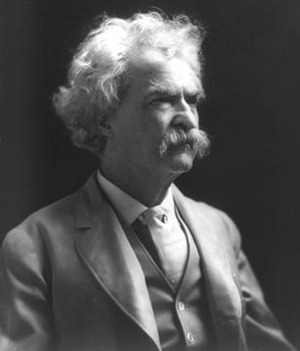Many characters in literature have helped express views on racism. The subject of racism is one that transcends all mediums of entertainment. Radio, television, movies, and books have all touched on the subject. Racism is a topic that is sensitive to most, but affects all. In the 1800s, things were no different. A country divided […]
Tag Archives: Huckleberry Finn
NOTE: I don’t mean to say “African American” to refer to Jim, or in hypothetical terms that happen in the novel, as black slaves at the time were not considered American citizens. Trying to find fault in this shot. Since its original publication in 1884, The Adventures of Huckleberry Finn, perhaps Mark Twain’s literary masterpiece […]
According to the Webster’s College dictionary racism is defined as prejudice against certain peoples. But what really is racism? In The Adventures of Huckleberry Finn by Mark Twain, the discussion of racism has increased since its debut. The novel has been banned by some public school systems and even censored by public libraries. But still […]
“The Adventures of Huckleberry Finn,” by Mark Twain is not a racist book, rather, it is an anti-racist’s attempt to denounce the injustices of slavery through the slave Jim, and the point of view of Huck, a young white boy. According to the Webster’s Dictionary, racism is, “a belief or doctrine that inherent differences among […]
Human beings long for freedom: for an escape from everyday life, from the iron grip of society or any other effect of life today. In Mark Twain’s book The Adventures of Huckleberry Finn, written in the late 1800’s, he clearly portrays the mighty Mississippi, the river that the story focuses around, as an escape from […]
The Finding of Huckleberry Finn has been labeled as a short story. A new picaresque adventure story that involves an anti-hero or picaresque who wanders around with no actual destination in mind. The new picaresque has many elements. It must contain the anti-hero, who usually exists with no place in society, is usually said to […]
The use of episodic development, or the linear chain of events, in The Adventures of Huckleberry Finn is an effective narrative technique. It provides both advantages and disadvantages to the plot line. The ending is a significant final portion of the novel that wraps up the characters analytically as a whole. Episodic development in the […]
Mark Twain begins The Adventures of Huckleberry Finn with the line “that book [The Adventures of Tom Sawyer] was made by Mr. Mark Twain, and he told the truth, mostly.” (1) From the beginning, Twain established lies as a key element in the text. It becomes clear as we read that the lies in the […]
American author Mark Twain was called the “Father of American Literature” by William Faulkner and the title was well deserved. With classic stories like The Adventures of Tom Sawyer and The Adventures of Huckleberry Finn, Twain set the standard for childhood adventures. Mark Twain was born Samuel Langhorne Clement on November 30, 1835 in Florida, […]
